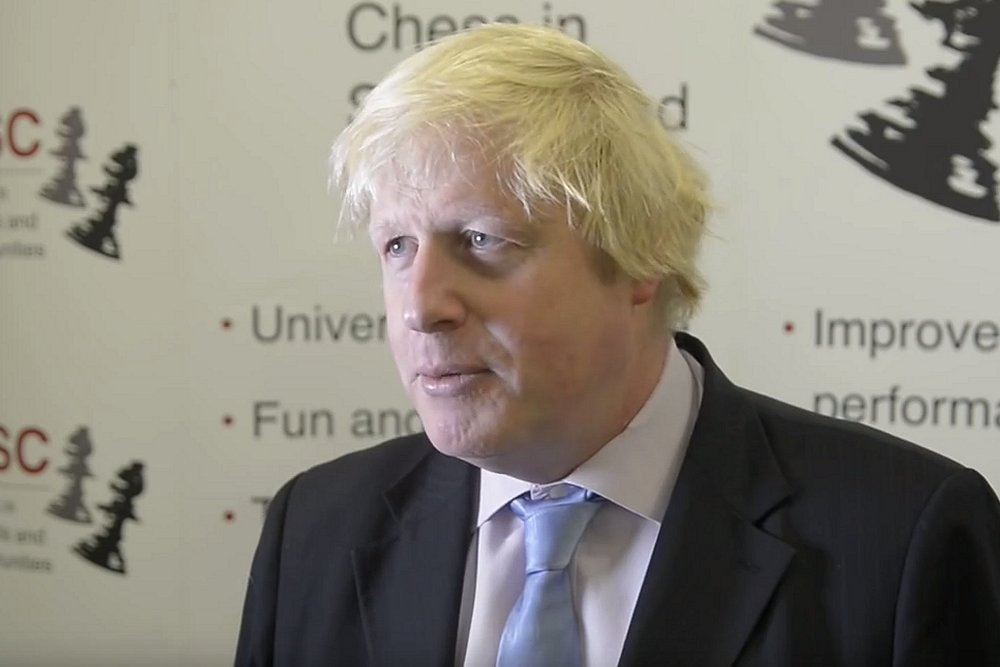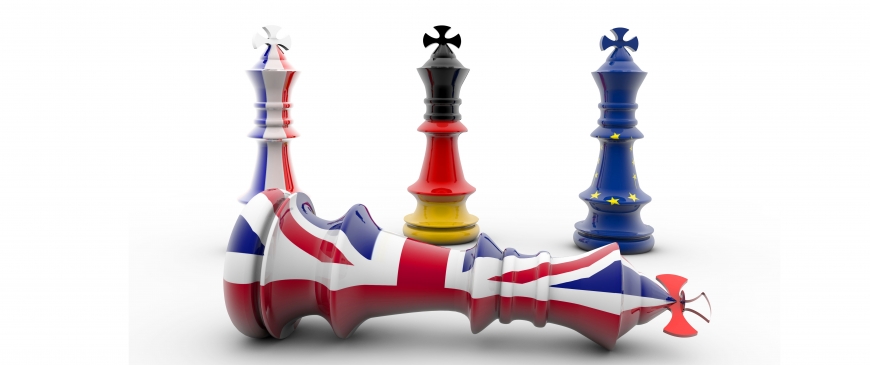


ChessBase 17 - Mega package - Edition 2024
It is the program of choice for anyone who loves the game and wants to know more about it. Start your personal success story with ChessBase and enjoy the game even more.
Boris Johnson, best known as the mayor of London, is the new Prime Minister of Great Britain after Theresa May failed to "deliver Brexit" and resigned as PM and Conservative Leader on June 7th.
Full of pithy statements on a variety of topics, and totally eschewing "political correctness", Johnson has been as polarizing a figure in the U.K. as Donald Trump has been in the USA.
The new Prime Minister has been one of the most energetic advocates of Britain's swift exit from the European Union even, if necessary, without any agreement on conditions of its departure. Now Johnson's rhetoric is on a collision course with reality and set to come to a head on October 31st...scary.

It turns out Boris is his middle name, and the new Prime Minister has quite an interesting ancestral picture.
Alexander Boris de Pfeffel Johnson, was born in 1964 in New York. His great-grandfather was Ali Kemal, briefly Foreign Minister of the Ottoman Empire in 1919 and murdered in 1922 at the behest of Nureddin Pasha. Johnson's grandfather emigrated to England and adopted the name "Wilfried Johnson". Another family line in Johnson's pedigree includes the German nobles Adelheid Pauline Karoline von Rottenburg, illegitimate daughter of Prince Paul of Württemberg, and Karl Maximilian Freiherr von Pfeffel. Johnson is even distantly related to the British royal family.
From 1999 to 2005, Johnson was editor of the news magazine The Spectator. In 2001 he became member of the British House of Commons. From 2008 to 2016 he was Mayor of London, then became Foreign Minister (until 2018). This week he was elected to head the ruling Conservative Party, putting him in line to succeed Theresa May as Prime Minister.
While mayor of London in 2014, Johnson attended the London Chess Classic and expressed his enthusiasm for chess as an educational tool.
"Chess is a wonderful game, it teaches rules and discipline, it is a fantastically logical game, and I think the sheer mental strain of it diverts the childrens’ natural energies which might otherwise go into doing naughty things. It’s to be encouraged. It’s the greatest mental game ever invented."
Mayor Johnson visits the 2014 London Chess Classic
More video evidence via Twitter via Olimpiu Urcan:
Boris Johnson and chess. The incoming UK Prime Minister. https://t.co/PFhndNv5kg pic.twitter.com/D19zHPnEg2
— Olimpiu G. Urcan (@olimpiuurcan) July 23, 2019
Translation from German: Macauley Peterson
By Macauley Peterson
Chess is of course a frequent metaphor in political discourse, often with unintentional humour and Brexit is no exception. Below are some of the highlights.
One of the earliest and well-known references came from chess journalist John Saunders:
A new idea in the English Opening - the #Brexit variation #chess pic.twitter.com/rut15mdiOv
— John Saunders (@johnchess) June 24, 2016
"Brexit: What will six-month extension mean?" (BBC)
[W]hat follows is likely to be more of the same: an angry stalemate fought against the backdrop of a profoundly divided country more sceptical than ever about the very fitness of the political system.
"The true reason Britain cannot call Europe’s bluff" (Prospect Magazine)
In trade, both sides lose—albeit the UK more substantially as a percentage of its economy than the EU, simply due to the difference in size. But in the world of regulators, all the consequences are on the UK side. The EU would have a regulatory system on 31st March 2019 which functioned exactly the same as the one on 30th March, except for the absence of the UK. Britain would have a black hole.
But actually, the problem of infrastructure covers trade too. In the absurdly named war cabinet, ministers will spend the next week or so debating the UK’s customs arrangements. It is equivalent to playing chess and calling it military campaign. There is no infrastructure being built to enact the demands that they are making.
"Brexit is a game of three dimensional political chess - and Jeremy Corbyn has made his biggest move yet." (Sky.com)
"Triggering Article 50 is just the first move in a game of fantastically complicated 3D chess" was the headline of an article way back in April 2017 on the website of "The UK in a Changing Europe"
The phrase three dimensional chess is a concept popular among social scientists, denoting a series of interlinked social ‘games’, each of which impacts on, and is affected by the other. Brexit means we may all become familiar with the concept.
"Everyone needs to be prepared for a speed-chess Brexit – especially Labour" (The Guardian)
The recent World Chess Championship set a new record, but it was not one likely to give the game more mass appeal. There were 12 slow matches, conducted in a soundproof glass box, between the reigning champion and his challenger – and every one ended in a draw. The contest was finally resolved only by quickening the pace with a deciding run of games in which the players had to think and move much more rapidly.
Something similar is going to happen with the four-dimensional version of chess known as Brexit. Grinding deadlock will be ultimately resolved by a fast-moving tiebreaker phase.
"Brexit is a steady game of chess – Labour is right to play the long game" (unitebrexitcheck.org)
We’ve learnt that the Brexit process is a steady game of chess not a sudden tug-of-war. There are many actors, of which Labour is just one. Advantage builds slowly, through successive moves. And it’s hard to see ahead very far into the future.
"If the Brexit negotiations are a game of chess, Theresa May is dangerously close to checkmate" (The Telegraph)
"Theresa May Put Her Head on the Block for Her Brexit Deal. It Might Not Be Enough." (The New York Times)
What remained to be seen was whether, like a chess player giving up her queen, she had managed to win the game on her last move."
There has been talk of Theresa May having been in zugzwang on Brexit.
— Jonathan Rowson (@Jonathan_Rowson) March 29, 2019
Maybe the whole country is now in a kind of reciprocal zugzwang.
Nobody really wants to move, because all available moves are bad.
In fact, while making no mention of chess, one of the best analysis of the whole Brexit situation comes from Grandmaster Jonathan Rowson, in his article "Brexit, Democracy and the Sacred".
Wondering if Boris Johnson and Donald Trump will soon be *competing* on the number of outright lies uttered by a political leader on a daily basis. It could be a public service to create that kind of league table; constructively metamodern in it’s spirit of sincere irony.
— Jonathan Rowson (@Jonathan_Rowson) July 25, 2019
Use the feedback to the editors link below!
David Arganian from Seattle writes:
He’s actually the great great great grandson of De Rivière (Morphy’s opponent) through his mother’s side of the family!